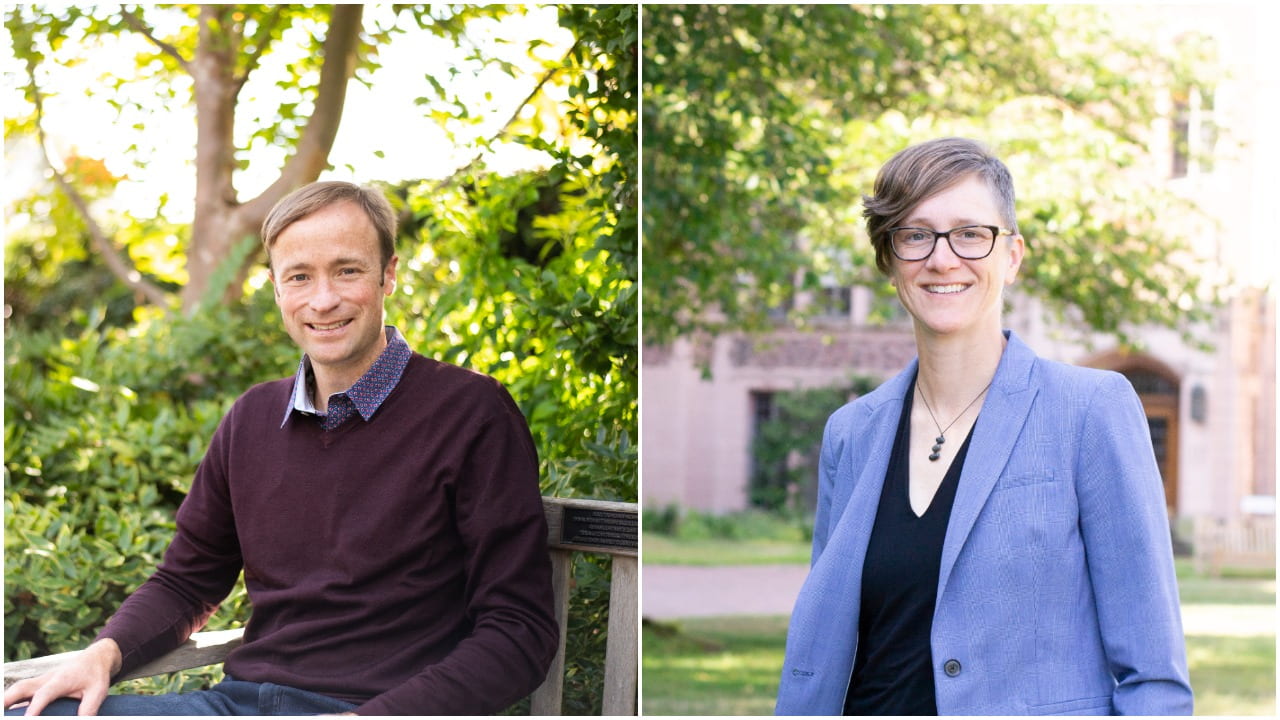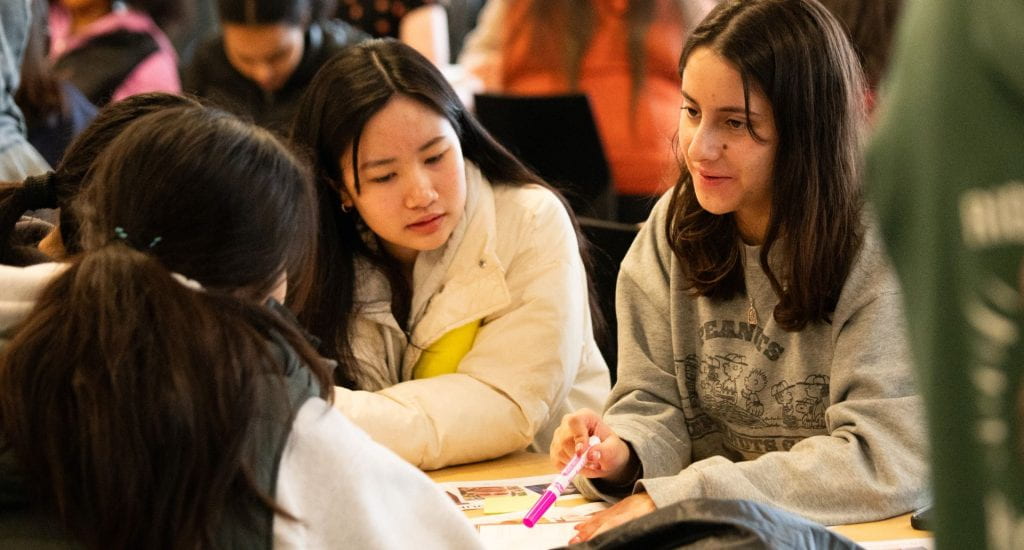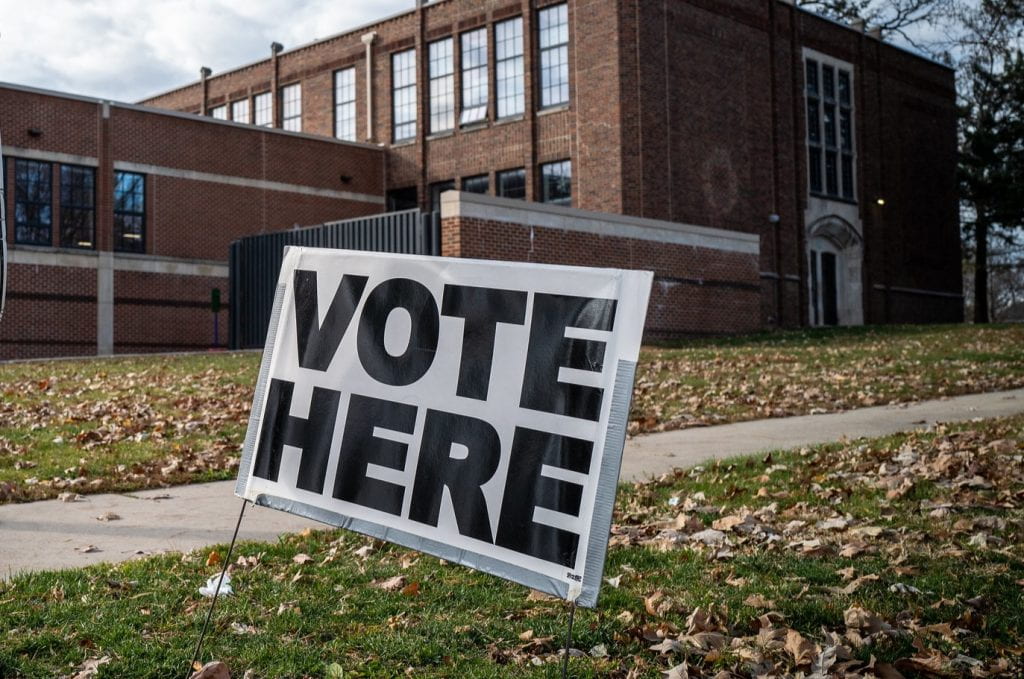By Michael Grass
In September, iSchool associate professor Jevin West’s two-year term as faculty director of the University of Washington’s Center for an Informed Public (CIP) came to a close when the center’s directorship transitioned to co-founder Kate Starbird, a UW Human Centered Design & Engineering associate professor and iSchool adjunct associate professor.
After two years of important work and impactful research, public programming and educational outreach, the CIP saw significant achievements during West’s term as director, including the center securing major federal research funding and new philanthropic support that has helped lay a strong foundation for continued successes as the CIP heads into its third year and beyond.
Since the John S. and James L. Knight Foundation awarded a team at the University of Washington $5 million in funding to establish the CIP in 2019, West, as founding director, has worked at a furious and energetic pace with an iSchool-based team that jumpstarted the center’s early operations all the while pursuing important research and engaging the public through educational programming, collaborations and other outreach.
“Sometimes I feel like I am running after something that is moving faster and further away from me. Spending my days and nights chasing misinformation sometimes seems futile, but fortunately I work with a team at the Center for an Informed Public across the disciplinary landscape that is as committed as I am to slowing the spread of misinformation and its negative impacts on society,” West said.
While the COVID-19 pandemic necessitated that the CIP shift its public programming from in-person events to online-only gatherings, there was great interest for the center’s research, expertise, and insights around mis- and disinformation all during a time of great uncertainty around the tumultuous events of 2020, including the COVID-19 pandemic and a volatile U.S. presidential election.
“The CIP’s mission of understanding and mitigating misinformation has only become more vital during these times of sustained disruption and uncertainty — especially as individuals are struggling to adapt to a changed and changing information environment,” said Starbird, who studies crisis informatics, collective sensemaking and rumoring around crisis events and the dynamics of online mis- and disinformation.
As the CIP’s first director, West appeared in scores of public-facing events, academic presentations, panel discussions and educational workshops. That has included speaking to dozens of local Rotary Clubs and community groups about how to spot misinformation, facilitating a popular AARP “factcheck ambassador” training program series in Washington state that was picked up by other AARP state chapters, and participating in book talks and workshops featuring Calling Bullshit: The Art of Skepticism in a Data-Driven World (Penguin Random House, 2020), the book he co-wrote with UW Biology professor and CIP faculty member Carl Bergstrom that’s based on the popular data-reasoning course at UW the two have co-taught at UW in recent years.
In the CIP’s second year, CIP-affiliated researchers — including its co-founders, faculty members, postdoctoral fellows, PhD students, graduate and undergraduate research assistants — have published more than 20 articles in academic journals and have been featured in more than 100 news interviews, including prominent coverage of the CIP’s work by outlets like The New York Times, The Washington Post, The Wall Street Journal, The Seattle Times, National Public Radio, the Associated Press and NBC News.
In a June Time magazine article by Duke University Center for Policy Impact in Global Health director Gavin Yamey and McGill University Tuberculosis Center associate director Madhukur Pai, the CIP was cited as an example of a scientific organization that has “responded with urgency and creativity to fight against what the [World Health Organization] calls an ‘infodemic.’”
The CIP’s response to the pandemic and associated infodemic wouldn’t have been possible without timely and vital research. Since the start of 2020, the CIP’s research infrastructure has collected more than 100 terabytes of social media data, including more than 11 billion tweets — and a curated dataset of more than 400 distinct misinformation “incidents” related to the 2020 election. It’s an important data repository that provides key insights about how mis- and disinformation, inauthentic behavior and problematic narratives took root, gained traction and were amplified on social media platforms.
In its first two years, the CIP contributed teams that supported rapid-response research through nonpartisan multi-institution mis- and disinformation research collaborations. The first, the Election Integrity Partnership, launched in July 2020 with Stanford Internet Observatory, Graphika and the Atlantic Council’s Digital Forensics Research Lab, tracked voting-specific mis- and disinformation before, during and after the U.S. 2020 elections. The CIP made significant contributions to the Election Integrity Partnership’s final report, “The Long Fuse: Misinformation and the 2020 Elections,” released in March 2021. Those contributions included an examination of the cross-platform spread of voting-related mis- and disinformation narratives and the role of “repeat spreaders” in amplifying false claims and distorted narratives that undermined trust in the elections and helped lead to the Jan. 6, 2021 insurrection at the U.S. Capitol.
A follow-up rapid-response research collaboration with Stanford that launched earlier this year, the Virality Project, tracked and analyzed how mis- and disinformation has shaped social media narratives about COVID-19 vaccines and vaccine hesitancy.
In June, Craig Newmark Philanthropies gave the CIP $1 million in funding to support the center’s rapid-response research work around election mis- and disinformation. In August, the National Science Foundation, through its Secure and Trustworthy Cyberspace (SaTC) program awarded a $3 million collaborative grant to a CIP-led team of researchers at UW, with support from Stanford, to further test and study multi-stakeholder models for rapid-response research of mis-and disinformation.
“Working to advance scientific understanding of online disinformation, this research will develop and evaluate ‘rapid response’ methods for studying and communicating about disinformation at a sophistication and pace on par with the dynamic and interdisciplinary nature of the challenge,” Starbird said.
The larger public discussion around mis- and disinformation comes at a confusing and volatile time with the pandemic and other crises when trust in government and institutions has eroded and even trust in science, normally held in high regard, has wavered.
“Science is one of the few trusted institutions and that trust has remained resilient for decades, but recently that trust has been declining in parts of the population, which is concerning,” West, who studies the science of science, said.
Bergstrom and West co-authored a paper, “Misinformation in and about science,” that was published this spring the Proceedings of the National Academy of Sciences, that argued that although ”[a]ppealing as it may be to view science as occupying a privileged epistemic position, scientific communication has fallen victim to the ill effects of an attention economy.” However, Bergstrom and West stressed in their paper: “This is not to say that science is broken. Far from it. Science is the greatest of human inventions for understanding our world, and it functions remarkably well despite these challenges. Still, scientists compete for eyeballs just as journalists do.”
There’s more work to be done to better understand how the forces of mis- and disinformation are shaping the ways we understand our information environments and society at large. As one of the CIP’s co-founders, West won’t be going far. His CIP contributions will continue as a member of the CIP’s Executive Council and will co-lead the CIP’s education and engagement work with iSchool senior principal research scientist and CIP co-founder Chris Coward.
That includes the MisinfoDay program, the annual educational program aimed at high school students and educators that initially launched at the iSchool in 2019. West describes MisinfoDay, which reached more than 1,000 students in classrooms around the U.S. in 2020, as some of the most important work being done at the center, which now organizes and co-presents MisinfoDay workshops through a partnership with Washington State University’s Edward R. Murrow College of Communication.
“Through MisinfoDay, we’re reaching more and more teachers and students, not just here in Washington state, but in places across the nation where we wouldn’t have expected,” West said. “There’s a hunger for this type of educational programming, which not only teaches students but also allows students to educate their parents and other adults.”
Starbird, now working as the CIP’s faculty director, said that West’s enthusiasm and dedication to the CIP’s work and mission in its first two years has laid an important foundation for continued work in the years ahead.
“Jevin’s leadership has helped establish the CIP as an important research organization that’s helping to guide multidisciplinary efforts that will help us better understand the dynamics of misinformation and can empower all of us to become healthier — and savvier — participants in online information spaces,” said Starbird.
PHOTOS ABOVE | From left, University of Washington Information School associate professor Jevin West and UW Human Centered Design & Engineering associate professor Kate Starbird. (Photos by Doug Parry)




